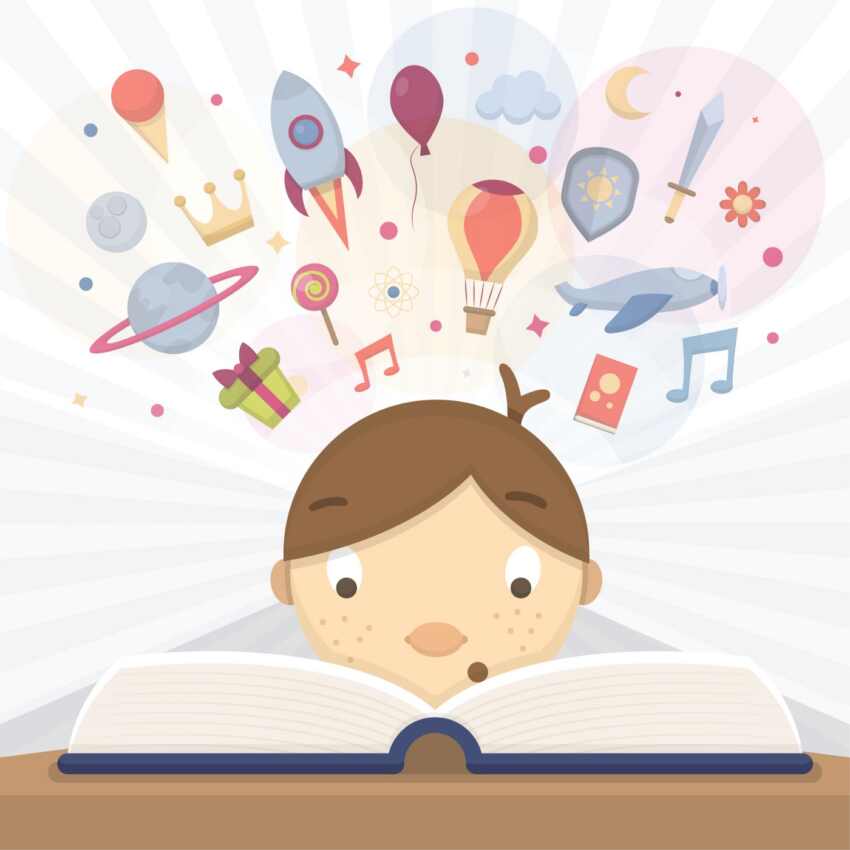Child development is fascinating. Human beings start as vulnerable infants who rely on caregivers for their every need, then, over time, turn into independent children and hopefully high-functioning adults. What happens during each of these milestones is essential to the next stage of your child’s development.
Social skills are learned a little differently from one another as your child grows up. A toddler, for example, won’t learn new skills the same way a school-age child might. The skills kids learn will vary depending upon need and environment. These skills build upon each other as they get older. Social skills training for kids is exceptionally important; starting early and building upon skills as a child grows will help them acquire what is necessary to become a well-developed individual.
Keep reading to learn about critical social skills for kids, and what age they learn those skills. Plus, we take a look at various activities you can try with your child to teach them these important skills!
Why Should a Child Learn Social Skills?
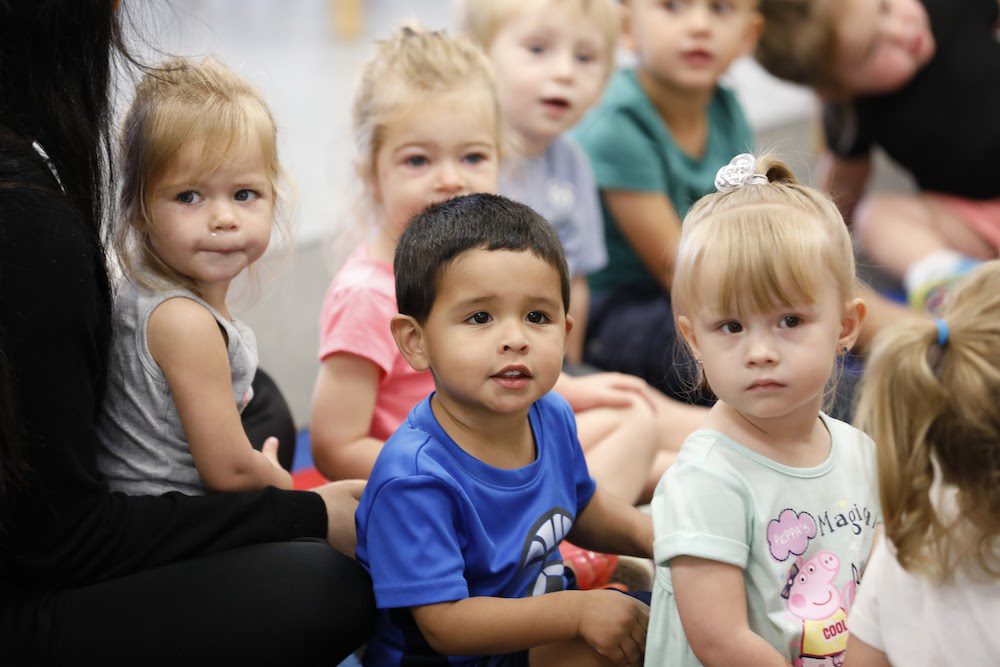
There is strong, valid research available that proves teaching social skills to children has lasting benefits. Children should begin learning basic social skills even as early as infancy.
The Benefits of Learning Social Skills as a Child
Whether social skills are taught in a social-emotional program at school, at home by parents, or even by a specialist such as a speech therapist or Board Certified Behavior Analyst, there are tons of benefits to doing so.
Teaching social skills to kids will help them be able to:
- Communicate effectively
- Problem-solve
- Make and keep friends
- Cooperate with others
- Practice active listening
- Use manners
- Adapt to different situations
- Utilize non-verbal cues
- Set and keep boundaries
- Share with others
- Say “no” appropriately
- Ask for help when needed
Overall, the effects of learning social skills lasts a lifetime for your kids.
For every one-point increase on the 5-point rating scale in a child’s social competence score in kindergarten, he/she was:
Types of Social Skills That Children Can Learn
So, what are the skills that your children can learn? Generally, the types of skills that children learn can be split into five categories:
- Physical social skills
- Socially-related social skills
- Cognitive social skills
- Behavioral social skills
- Adaptive/functional social skills
The way that your child will learn skills in each category will depend on a few factors. Naturally, the type of skill will change how your child learns it. For example, your child will learn how to listen differently than they learn how to share with their friends.
Ready to see all the amazing things your child will learn to do? Follow along in your child’s development as we break down the skills they learn by age.
Social, Cognitive, and Motor Skills Activities for Kids by Age
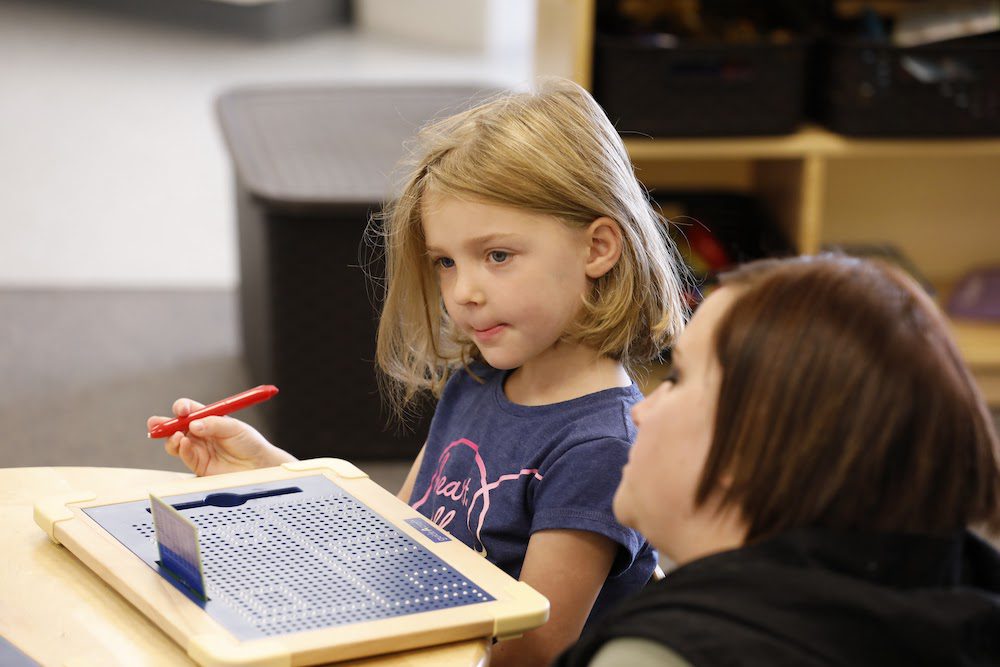
When you think of your baby, the first thought likely isn’t about their social skills. After all, they’re a baby! However, infancy is when the brain is the most malleable. The synapses created and connections made in the first three years of life are so numerous and frequent—this is when important external input is happening.
Experts at the Urban Child Institute say it simply enough: “Genes provide a blueprint for the brain, but a child’s environment and experiences carry out the construction.”
Below are examples of critical social skills for different child development stages, as well as social skills activities you can try with your kids.

Infants 2 months to 1 year
Skill #1: Two-Way Communication
Two-way communication is the act of two individuals exchanging forms of communication back and forth (verbal or non-verbal). You’ve likely noticed that your baby can be pretty social with you! That’s because babies will communicate with their caregivers in one form or another. At this stage, behaviors are copied from what they see and hear. Caregivers can help their infant learn to communicate back and forth by:
- Using appropriate eye contact
- Using non-verbal’s appropriate for the situation
- Responding to each other’s styles of communication
- Talking often to the infant/having a conversation even though the infant may not be able to say actual words at this stage.
Activity ideas for two-way communication include:
Skill #2: Exploration
As your baby grows, they’ll start to move around more, and their natural curiosity will have them exploring their surroundings. Being able to do this is important to their physical, emotional, and social development. By exploring, infants can begin to develop more independence, and more trust in their environment and the people around them.
Activity ideas for infant exploration include:
- Provide baby with items and toys that will stimulate different senses
- Allow baby to have new and enriching experiences daily
- Give the freedom to roam in a safe environment
- Let baby get messy—too much structure doesn’t allow for exploration
- Take baby to the zoo, on a nature walk, or to a festival; they really do take it all in!
Skill #3: Communicating Needs/Self-Advocacy
Communicating effectively and appropriately is a huge part of helping your baby become socially aware. Even though infants don’t typically speak their first actual words until around a year or later, they can still understand a lot more than people think.
Teaching an infant how to communicate their needs at this stage will not only cut down on your frustration when they begin to cry, and you don’t know why, but it will help them to be less frustrated and get their needs met.
Activity ideas to help infants communicate their needs:
- Learn Baby Sign Language and teach it to baby
- Use pictures or a communication board
- Research and learn more about infant communication
- Learn baby’s non-verbal cues and types of sounds
- Practice sounds and simple words with baby
Skill #4: Emotion Regulation
psychology defines emotion regulation as “the ability to exert control over one’s own emotional state.” The importance of this is to grow into an emotionally healthy child and adult who can identify their emotional state and alter it if needed (such as if s/he is too angry or frustrated) and utilize coping skills to regulate those unwanted emotional states.
While this seems much too complicated for your infant (they can’t choose a specific coping skill to use, for example), emotion regulation does begin in infancy if it’s taught in the right environment. Much of an infant’s ability to regulate their emotions has a lot to do with the attachment style s/he has with the caregiver. An infant whose caregiver provides too much attention or not any attention.
Activity ideas to help an infant work on their emotion regulation:
*Most of these ideas are what the caregiver will do.
- Give reliable and consistent protection and support to baby (secure attachment style)
- Keep a routine
- Modeling emotion regulation (taking a break, deep breathing, talking about emotions)
- Help baby self-soothe with the use of a stuffed animal or pacifier
Skill #5: Expressing Emotions
Your kid learns how to express emotions from their parents by copying what they see and through their own trial and error. If an infant frowns or looks as if s/he is going to cry, the caregiver will more than likely respond with comfort or solve the problem. The infant then learns s/he will get certain reactions for certain expressions/emotions shown.
Activities to help infants learn how to express emotions:
- Singing and dancing
- Imaginative play
- Reading picture books about feelings
- Looking at pictures of other infants expressing different emotions
- Modeling different emotions for babies and naming them.

Toddlers (1-4 years old)
The following are skills for kids that are in the toddler years.
Skill #1: Cooperating and Sharing
Cooperation is an important social skill activity category for kids. As they say, sharing is caring!
As toddlers start being social with others their age at school or a playdate, for them to make and keep friends, they must learn how to cooperate in a group and the act of sharing. Learning how to play fair and make things fair while being kind and respectful is a must at this stage in development.
Activities to help toddlers learn about cooperation and sharing:
- Obstacle course or relay race
- Make a tower or build something together
- Work on a puzzle together
- Play a game in which participants take turns
- Follow the leader
- Donate a toy
- Create a sharing box or bin
- Role-play and model sharing
- Positively praise appropriate behavior
Skill #2: Following Directions
Now that your child is a toddler, they can walk, talk, and explore. They can also be somewhat independent throughout the day as they learn new skills. Following directions (following step-by-step instructions and learning to follow them without arguing) are skills for kids that those in the toddler years absolutely need to learn.
Activities to teach about following directions:
- Simon Says
- Stop, Wait, Go
- Using books and songs with instructions
- Hokey Pokey
- Practice giving one to two-step directions
- Model how to follow multi-step directions
- Positively praise for following directions on the first prompt
Skill #3: Using Manners
Wouldn’t it be nice if all children naturally used good manners? Of course! But, the road to good manners is paved with plenty of practice and learning. That’s why caregivers and teachers need to teach, teach, and teach these skills by modeling and practicing with their toddlers.
Activities to teach manners:
- Read books and sing songs about manners
- Have a “tea party” or family meal where everyone practices good manners
- Mind your manners game
- Practice sharing toys/craft items/sports equipment
- Yes please ,No thanks game
- Keep pictures and visuals up for reminding toddlers about manners
Skill #4: Communicating Needs Appropriately
Now that toddlers can speak, it is important for them to learn how to communicate their needs appropriately. Crying, like an infant needs to, no longer works. Communication skills for kids are imperative to their success in the real world.
According to the experts at positive psychology eight fundamentals of communication include empathy, pausing, introspection, turn-taking, established procedures, conversation skills, respectful vocabulary, and practice in natural settings.
Activities to promote effective communication:
- Show and Tell
- Turn-taking
- Picture-telling
- Model and practice active listening
- Telephone
- Charades
- Practice asking and answering questions
Skill #5: Respecting Personal Space
Toddlers don’t yet understand what personal boundaries are and why someone might want their personal space. This needs to be taught to them explicitly. Learning the social skill of respecting personal space, toddlers will have a better chance of making and keeping friends.
Activities to promote boundaries:
- Practice with boundary lines (tape or string on the floor)
- Stage conversations or activities with boundary lines
- Use visuals and stories to teach about personal space
- Teach about parts of the body and nonverbals

Primary School (around 5-6 years old)
Once they enter preschool and kindergarten, the skills for kids get more complex and involve more internalization and self-reflection. Problem-solving skills and making choices that will affect them and others are typically learned at this stage.
Skill #1: Self-Control
The emotion regulation skills that children learn before this stage are a must when learning self-control. Emotion regulation is more about calming and self-soothing at previous stages. In contrast, self-control (a part of emotion regulation) is more about understanding that actions affect others. When kids are in this stage and in school, they need self-control to sit still, follow directions, control impulses, and act appropriately.
Activities that can help teach self-control are:
- Simon Says
- Freeze
- Wait Five
- Duck Duck Goose
- Staring Contest
- Follow the Leader
Skill #2: Conflict Resolution
Like self-control, conflict resolution is a more advanced skill that typically won’t be learned in the previous stage. Kids in school need to be able to solve their own interpersonal conflicts in a healthy way.
Activities that will help kids learn about conflict resolution include:
- Role-playing scenarios
- Point out conflicts from TV shows/movies and talk about them
- Teach about compromising and making a “middle path”
- Conflict Resolution Visual Tsk Cards
- Model empathy
- Practice apologizing
Skill #3: Patience
Having patience is difficult even for adults; therefore, it is important to start learning this critical social skill early on and promote patience in all sorts of situations.
Activities to practice patience include:
- Help kids to avoid instant gratification (start slowly)
- Give kids strategies to help them be patient (deep breathing, count to 10, etc.)
- Use a timer or a visual when the child is waiting
- Practice taking turns
- Model patient behaviors
Skill #4: Good Hygiene
At this stage, potty training should be over with, and kids should be more independent when it comes to following good hygiene. Hygiene is a social skill because people are more likely to want to be around a clean, well-groomed person who smells nice. Kids can get dirty and stinky—it is beneficial to teach them what to do if this happens throughout the day.
Activities to promote good hygiene are:
- Place hygiene-reminder visuals in the home and at school
- Discuss the places germs hideout
- Read books or watch videos about good hygiene
- Have kids make their own hand-washing poster
- Post a hygiene checklist at home (hands, face, body, hair, teeth, etc.)
- Make hygiene fun with good-smelling and fun-colored products
Skill #5: Being a Good Sport
These skills for kids are critical. Kids will have a chance to show good sportsmanship in the classroom, at home, at recess, at birthday parties, and during sports. Those who are bad sports aren’t all that fun to play with. A social skills activity for kids that centers around sportsmanship should promote kindness, acceptance, respect, and encouragement.
Activities to teach sportsman-like behaviors include:
- Practice playing games at home and don’t let the child win
- Make sure the caregiver, teacher, or coach models being a good sport when they lose
- Set the rules of the game and stick to them
- Help the child learn from mistakes and move on with grace
- End the game with a handshake or congratulations
- Watch videos and read books about being a good sport.
There are some obvious and drastic physical, emotional, and physiological changes between each child development stage. This is obviously why an infant, toddler, and primary-aged child will work on different social skills activities, but many build upon each other.
For example:
- An infant works on emotion regulation and coping using a blanket, stuffed animal, or pacifier; infants also have a secure attachment with their caregiver and can self-regulate by snuggling or being held.
- A toddler continues to work on emotion regulation by expressing feelings, finding other items that are comforting aside from a pacifier, and they begin to actively learn more about emotions and feelings.
- A primary school-aged child works on emotion regulation by asking for help, identifying emotions and specific coping skills to go along with more difficult ones, and talking to others about their feelings.
The result will be similar: the child, over time, will learn how to cope and regulate his/her own emotions, yet the strategies used will become more advanced, and thought will be put into actions and consequences.
Each of these social skills listed are critical to teach children—at home and in a school setting. Without them, healthy children may grow up to be maladaptive and not function on the same level as similar peers. We all want our children to be successful and have the most effective tools or social skills to be so.
Where do Kids Develop Skills Best? Pros and Cons
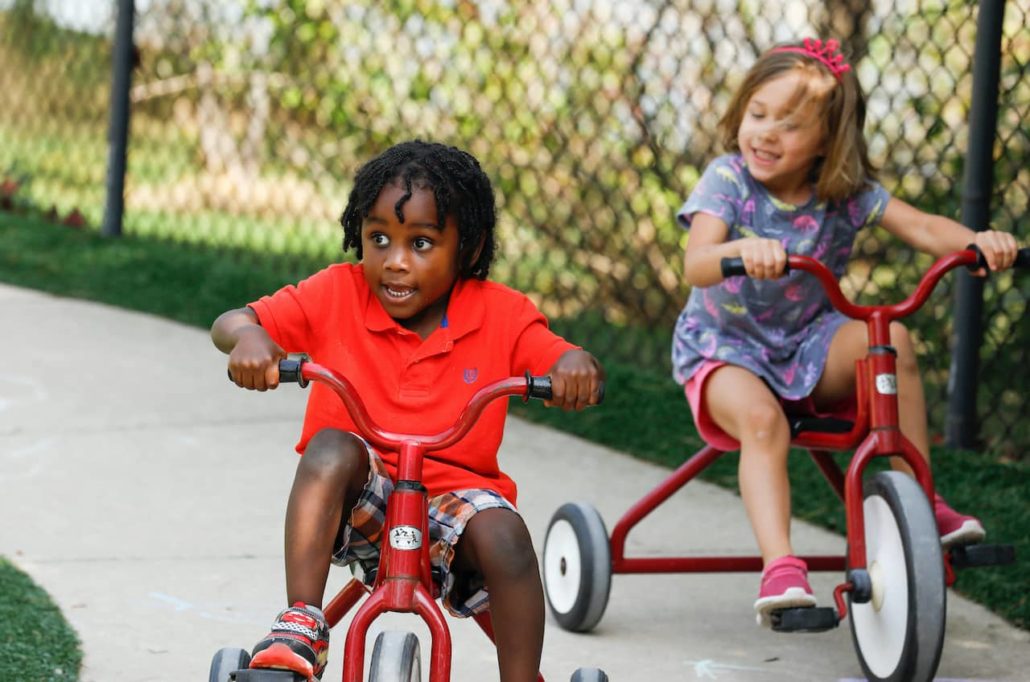
At Home via Homeschooling or Virtual Learning
Pros:
Children who are taught at home during their early primary school years can absolutely be trained on various social skills. In a way, being at home while learning social skills may give the caregiver more control over the environment and what will be taught and how. Being at home can give the child more one-on-one attention, and caregivers may have more time and flexibility to introduce the child to novel experiences, such as going to a museum and practicing certain skills. At this time during the pandemic, technology has made it easier for students who learn at home to get access to other students and activities via Zoom or another online platform.
Cons:
Some children who are taught at home have less access to peers and groups of peers necessary to teach certain social skills. Many skills, such as showing good sportsmanship, cooperation, and self-control, would best be learned and practiced with other children around. Caregivers may need to be a little more creative when thinking of social skills activities to use when there aren’t many other children involved.
In a School Environment
Pros:
Interactive social skills activities for kids are sometimes much easier to create in a classroom setting due to having access to multiple students in one area. Not only can teachers do whole-group instruction on skills, but they can also differentiate by grouping students based on need and skill level. It is always beneficial for kids to be around other kids in a social environment. In the classroom, teachers can also embed social skills training into each subject area and within each environment at the school by using a classroom matrix
Cons:
Students getting social skills training in a classroom setting may not get as much one-on-one attention due to classroom demands and the number of other students in the class. Also, certain students may be poor examples in relation to social skills, and vulnerable children may pick up on bad habits if not addressed.
Regardless of the caregiver’s learning environment, social skills should be explicitly taught, and appropriate behaviors should be positively praised and rewarded.
Prepare Your Children to Thrive
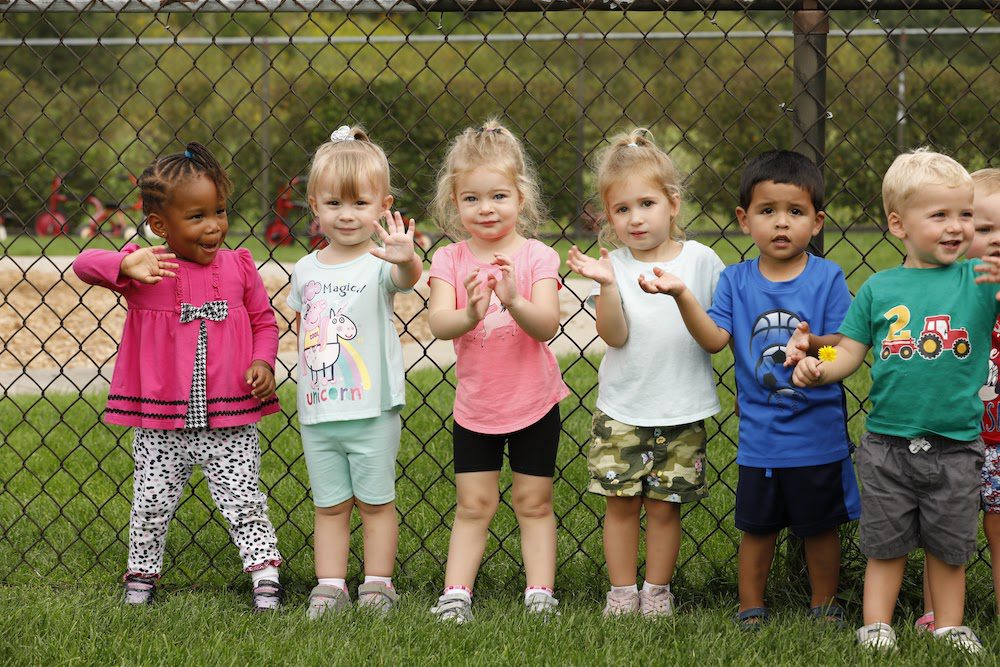
Schools that know a thing or two about positively teaching and promoting social skills among children are Cadence Education schools. They also provide students with engaging and creative content-based lessons while using various types of curriculum.
The Ascend curriculum combines skills-based learning across nine different learning domains, including literacy, math, science, physical fitness, creative expression, social-emotional development, cultural understanding, technology, and language.
Another curriculum offered in some Cadence schools is the Pinnacle Curriculum, a faith-based curriculum designed to encourage children to develop their emerging skills in developmental areas while discovering and experiencing God’s love.
Some Cadence Education schools also offer Montessori and Private Kindergarten programs as well.
Cadence staff provide parents with peace of mind by giving children an exceptional education every fun-filled day in a place as nurturing as home.
SHIJINA RIJESH



